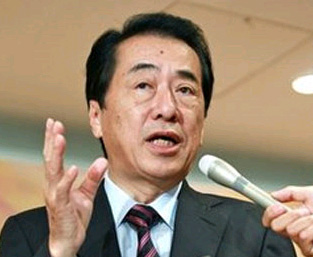Japan PM resists party pressure to resign
Japan's embattled Prime Minister Naoto Kan resisted growing pressure from his own party on Monday to say exactly when he will step down in order to end a political stalemate.
Kan met executives of his Democratic Party of Japan (DPJ), who said he could leave office in July if the opposition agrees to pass key bills, Kyodo news agency said.
 One of the bills aims to finance rebuilding efforts
in the areas hit by the March 11 quake-tsunami disaster and ensuing nuclear
crisis, while another is needed to issue bonds for the current fiscal year
ending March 2012.
One of the bills aims to finance rebuilding efforts
in the areas hit by the March 11 quake-tsunami disaster and ensuing nuclear
crisis, while another is needed to issue bonds for the current fiscal year
ending March 2012.
Kan also told the meeting he is keen on passing a further law promoting renewable energy as the debate over atomic power rages following the accident at the Fukushima Daiichi nuclear plant, media reports said.
The premier and party executives held another meeting late Monday but they again failed to agree on when Kan should quit, Chief Cabinet Secretary Yukio Edano told reporters.
On June 2, Kan defeated an opposition no-confidence motion by pledging to step down once the quake recovery takes hold, but without giving a firm date, a move that placated rebels within his own party who had threatened to oust him.
Since then, Japan's political class and media have been feverishly speculating over his possible departure date and replacement, dismaying the nation with their infighting and power plays at a time of crisis.
The current session of parliament is due to end on Wednesday but DPJ secretary general Katsuya Okada told opposition leaders that it should be extended by about 120 days to clear the key bills.
"It is not that the premier's tenure will be extended by as many days," Okada said.
But Nobuteru Ishihara, secretary general of the main opposition Liberal Democratic Party, said: "We cannot help the premier prolong his (political) life by four months."
Kan, who replaced Yukio Hatoyama just a year ago as prime minister from the centre-left party, has been criticised for his slow handling of the crisis after his approval ratings dipped below 20 percent.
His advocacy of a consumption tax hike to 10 percent angered many voters and the DPJ, which won a landslide in the 2009 general election, lost ground in the upper house following a vote in July last year.
Kan has been widely seen incompetent in tackling Japan's key challenges - reviving the world's third biggest economy, which was thrown back into recession by the disaster, and whittling down a massive public debt.
- AFP/de
 Indonesia has potential to become Asia's new economic power: President
Indonesia has potential to become Asia's new economic power: President
 The spiral of conflict in the Gaza Strip
The spiral of conflict in the Gaza Strip
 Japan to help ASEAN keep closer watch on greenhouse gas emissions
Japan to help ASEAN keep closer watch on greenhouse gas emissions
 Thai transport ministry launches 2.68 trillion THB infrastructure project
Thai transport ministry launches 2.68 trillion THB infrastructure project
 New Japanese Prime Minister with the mission to restore trust
New Japanese Prime Minister with the mission to restore trust
 ASEAN+3 to grow at 4.2% in 2024: research office
ASEAN+3 to grow at 4.2% in 2024: research office
 Thai PM outlines vision for regional cooperation at ACD forum
Thai PM outlines vision for regional cooperation at ACD forum
 Vietnam - a prime example of effective cooperation with UNESCO: Official
Vietnam - a prime example of effective cooperation with UNESCO: Official
 Strong earthquakes strike Philippines, Tonga
Strong earthquakes strike Philippines, Tonga
 Thailand school bus fire: Death toll rises to 25
Thailand school bus fire: Death toll rises to 25




